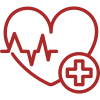Description
"Heart Disease" What You Need To Know To Understand And Reduce Your Risk...
#1 International Best Seller!
What Is This Audio Book About?
As a cardiologist, I have not yet met a patient who expected to have a problem; patients do not put into their diaries “possible problem with my heart next week”. Yet, what if we could be forewarned about, or prepared for, a potential problem with our coronary arteries? … What if we could plan NOT to have a heart attack?
Have You Planned Your Heart Attack? is the first-of-its-kind, offering a balanced and referenced discussion of coronary risk assessment using modern technology. Taking a picture of the coronary arteries using CT (computed tomography – x-rays are deflected at very high speed using enormous magnets to acquire images that are then reconstructed) to see the health of the arteries, is not new, it just isn't done routinely. Yet, by using these advances specialists, GPs and patients can be ahead of the cardiovascular health game.
frequent buyer
Reviewed on 3rd Mar 2026
This book should be in every general practitioner’s personal library…and waiting room!
“HAVE YOU PLANNED YOUR HEART ATTACK?” by Dr. Warrick Bishop
Planning Your Heart Attack? An intriguing title! While sitting in Warrick’s waiting room for my husband’s cardiac appointment, I spotted the book. A few minutes spent leafing through it convinced me to purchase a copy on the spot!
This book is a fascinating, well presented, thoroughly researched treatise in lay terminology, of the preventability of coronary heart disease, utilising proven, painless, affordable testing…a proactive solution to today’s escalating rate of cardiac pathology, particularly in the ‘young and fit’.
Warrick, a highly qualified, much published author, employs humour and colourful graphics to illustrate the effectiveness of his theory in a most engaging way. Considering our severely overloaded health system, large scale implementation of his philosophy might not only benefit those at risk, but could mitigate problems such as ambulance ramping, lack of beds and overworked staff.
This book should be in every general practitioner’s personal library…and waiting room!
Penny Morton
Patrizia Hild
Reviewed on 3rd Mar 2026
Save Your Life with a painless test
Anyone interested in longevity and that's all of us, you need to read this book. No matter if your fit and healthy or obese, heart health does not discriminate. Do you think you are infallible ? Well think again. If you follow Dr. Warrick Bishop recommendations you will thank him from the bottom of your heart. If you selected your own parents prior to inception and have no genetic heart disease in your family well then congratulations. For the rest of us, that's everyone, you should read this book as a priority especially if you are approaching 40 years of age and have the genes. It is never too late for all of us, genetics or not, to have it done at least once in your life. It might save your life.
Stephen
Reviewed on 3rd Mar 2026
Good news or not so good news
If you have a heart, this book is for you. Although the content of the book might have a measurable impact on the medical and medical insurance industries, it has been written for the man and woman in the street. The book does not make use of scare tactics, but rather educates the reader in a logical and structured manner. The message is simple, there is CT scanning technology available today that can inform the patient whether he or she is at risk of having a heart attack in the next 5 to 10 years. This informs the patient of a possible incident before it happens. The CT scanning approach to heart care moves the patient (you and me) away from statistical analysis (high blood pressure, cholesterol levels, family history, etc.) to specific knowledge about the condition of the patient heart, Good news or not so good news, wouldn't you want to know? Read the book.
Dave
Reviewed on 3rd Mar 2026
Informative and thought provoking, a conversation in health that must be had.
Having a back ground in health care I found this book to be informative and interesting.
Maintaining the health of people and the provision of health care in order to best achieve this goal is a complex and fascinating subject, one that requires insight, understanding, examination and reflection. In his book Dr Bishop examines his sphere of expertise and poses the question are we doing the best we can to keep people as healthy as we can? Along the way he challenges the status quo and proposes that conversations must be had in order to make sure we are making health care the best it can be. By having common sense discussions and making best health outcomes the a number one priority, Dr Bishop proposes that perhaps we can do better, a message in my books that is always worth consideration. Well done.


